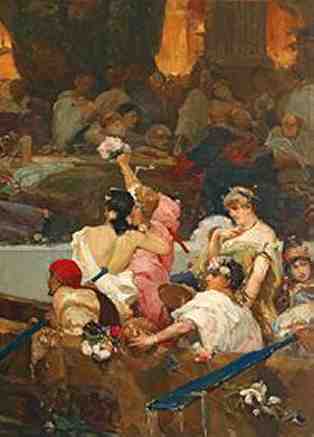Evgeny Abramovich Baratynski was born in 1800, briefly educated in an aristocratic military
school, served in the Petersburg footguards, was posted to Finland, and began writing the poetry much
admired by Pushkin’s friends and their circle. In 1826 he married and settled in Moscow,
turning out several volumes of verse. The early work is light verse, but fastidiously turned,
and then came three verse novels: Eda, The Ball and The Gypsy Girl, reminiscent of Pushkin,
but more realistic and less successful. Pushkin’s earlier poetry has an easy naturalness,
but in Baratynsky the careful thought and effort
remain in the lines, accomplished though they are.

Baratynsky’s verse is sonorous, with a cold, metallic brilliance that brings out a carefully tempered wit that belongs more
to the previous century. Like the equally famous 'Autumn' of 1837, this 'Death' of 1829 is also
splendidly rhetorical in the grand manner of classicism,
but with Baratynsky’s own personal note of melancholy.
Смерть
Смерть дщерью тьмы не назову я
И, раболепною мечтой
Гробовый остов ей даруя,
Не ополчу её косой.
О дочь верховного Эфира!
О светозарная краса!
В руке твоей олива мира,
А не губящая коса.
Когда возникнул мир цветущий
Из равновесья диких сил,
В твоё храненье Всемогущий
Его устройство поручил.
И ты летаешь над твореньем,
Согласье прям его лия,
И в нём прохладным дуновеньем
Смиряя буйство бытия.
Ты укрощаешь восстающий
В безумной силе ураган,
Ты, на брега свои бегущий
Вспять возвращаешь океан.
Даёшь пределы ты растенью,
Чтоб не покрыл гигантский лес
Земли губительною тенью,
Злак не восстал бы до небес.
А человек! святая дева!
Перед тобой с его ланит
Мгновенно сходят пятна гнева,
Жар любострастия бежит.
Дружится праведной тобою
Людей недружная судьба:
Ласкаешь тою же рукою
Ты властелина и раба.
Недоуменье, принужденье —
Условье смутных наших дней,
Ты всех загадок разрешенье,
Ты разрешенье всех цепей.
1828
The poem is written in simple tetrameters, rhymed AbAb:
Смерть дще́рью тьмы не назову́ я 4A
И, раболе́пною мечто́й 4b
Гробовый о́стов ей дару́я, 4A
Не ополчу́ её косо́й. 4b
A TTS Audio Recording of the opening stanzas:
C.M. Bowra reproduced the feminine rhyme, effectively, with a
beautiful 8th line:
I call not Death the child of darkness,
Nor, with the fancy of a slave,
Give him a scythe to arm his starkness
Nor skeleton from out the grave.
O offspring of the air our master,
O ornament with brilliant charms,
You bear no scythe that brings disaster
But peaceful olive in your arms.
When first the world arose in flowers
From raging forces matched and blent.
To you a guardian’s rule and powers
Were trusted by the Omnipotent.
Death
Call death no daughter of the dark
nor yet the dreamings of a slave,
nor will a coffin serve to mark
and stop the scythe above the grave.
It is the offspring of the air,
a radiant beauty, one alive
to what the peaceful olives bear
and not disasters of the scythe.
And when the world arose in flowers
and forces, checked, should find consent,
it was for your almighty powers
that you were called omnipotent.
A ruling all creation sees
you bring an order, bring a peace
and, in this, like a cooling breeze
insist that being’s riot cease.
You tame the most rebellious,
and curb the power of hurricane:
and waves, the most tempestuous,
you turn toward the shore again.
You set the bounds to humble plants,
even to forests’ enterprise:
you set your shadow over each advance
that grasses do not touch the skies.
As holy virgin to the man
you come to dowse his instant fires
that quietly he submits and can
be master of those fierce desires.
Befriended by the righteous, you
will bring all nature to its fate.
To your caressing hand will too
fall both the lowliest and the great.
Compulsions and perplexity,
where all our losses wipe out gains:
in this much tangled world you free
us of our mysteries and chains.
1. Mirsky, D.S., A History of Russian Literature (Knopf 1926 / Vintage Books 1958) 104-7.
2. Bristol, E., A History of Russian Poetry (O.U.P.) 116-18.
Russian poem translations on this site: listing.